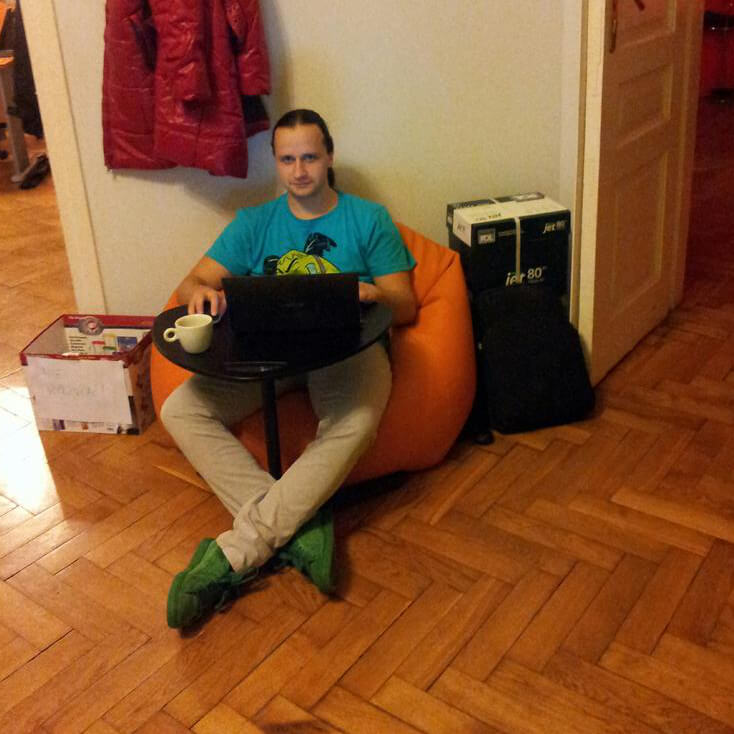How we work pt. 1: A portable boss.
We’re agile here at Lunar Logic. We didn’t invent gunpowder, these times _everybody _is agile. And that’s a good thing. But not every company has got a portable boss, has it?
Meet Paweł. A laptop desk, a bean bag and a recycled cardboard box – that’s all he needs to set up a flying office. He can usually be found in a few rooms in our office, shifting his spot couple of times a day. Or a week. The pattern changes. Not only because of a possible back pain – there are several reasons for him being in motion. Some of which have already changed our company.
I’ve decided to present this method of floor-rule from the viewpoint of the crew of our hierarchically flat company. It’s worth noting that he’s also been the scrum master for some months now and a project manager of one inside work of ours lately, so the working relations between him and various people at the company vary.

Why am I writing this, and not Paweł? Firstly, because he already wrote about his flying desk. Secondly, he’s still the boss and the answer’s he’d receive could be a bit biased. His opinion is here, nonetheless.
So – do you like having a portable boss?
Mirek (marketing guy)
I’m in two minds here. On the one hand, it’s grand when the boss’s your buddy sitting next to you, going together for your daily caffeine fix, cracking jokes and ridiculing one another. He doesn’t feel so detached as if he was confined in his office, behind a massive slab of a desk. More… human? I’d say.
On the other hand, I can’t fully feel at ease when having him around. My harmless slacking over yet another TechCrunch article I must read makes me uneasy, for it doesn’t yield palpable results. Somehow I experience a state of a constant standup – it feels bad to say “I haven’t done anything today” even though I know I was busy.
However, the more tangibly productive I am, the less I’m aware of the boss in the room and the more of a peer, who just decides about things.
Hania (coder)
Paweł is a scrum master in my project. I grew so accustomed to him being around that when he’s not present, I’m wondering what’s the reason. His presence in our room makes him aware of the problems on the spot and not only at the retrospective. It also levels the traces of hierarchy that exist in our company to nil.
Grzester (QA)
I don’t have to run around to find the boss when he’s needed. He’s not tucked in a room, sheltered behind a desk and closed doors. There is no artificial barrier between us and him.
There is no “boss” – just a member of the project, who also is the project manager. I think that the integration does the trick – a “traditional” chief with all the trappings of a big leader wouldn’t be able to mold with us so easily.
Tomek (coder)
I’ve finally witnessed what CEOs do. This role was overlapped, however, by his actions as the project manager. Deliberately, Paweł has become our peer, whether he liked it or not (and he rather liked it ;).
Paweł (the culprit)
I can grab my flying office in my hands and move it to the place where I’m needed or I feel like I can be helpful. I need just a bit of space in a corner or by the wall and done – a new office set up.
Surprisingly, sitting in the corner and almost on the floor has a few unexpected advantages . First, you need very little physical space, which means you will fit to almost any room (unless it is already packed beyond any healthy limits). Second, this way you become almost invisible, which definitely helps if your goal is to understand how the team functions, and not just scratch the surface.
Third, and arguably most importantly, you strip yourself from status symbols. Instead of a huge desk dubbed by your colleagues as the airstrip, a leather armchair and a locker just the simplest set that does the job.
All in all, you’re way more accessible and much less intimidating. Isn’t that something every single leader should strive for?
It’s a big step
I’ve been very cautious not to say that something “depends“. I believe that this word strips a thought of its power. Truly, being a portable boss takes guts. Be prepared to experience uneasiness and awkward looks and situations.
Of course, it is easier for an accomplished extrovert to become a flying Dutchman in his office. It doesn’t mean, though, that, given favorable company culture, a timid number cruncher shouldn’t change his working place every once in a while.
Especially if they used to live in their office, behind a huge desk and closed doors.
Stay tuned for How we Work pt. 2. You’ll see our happiness measurement system.
